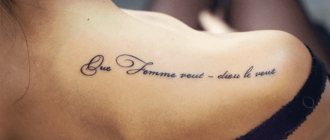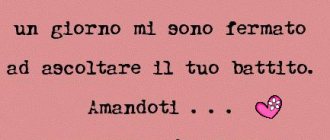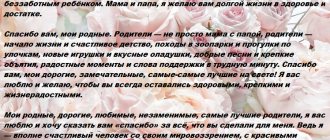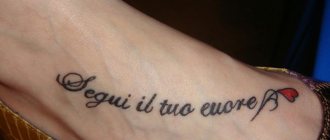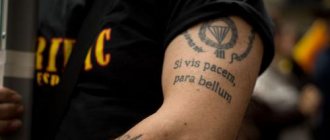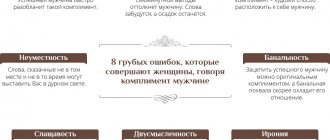Interesting and beautiful words will attract attention to your nickname, status, they will decorate a tattoo, craft, postcard, congratulation. They can be used as the name of your own group, store, salon, brand.
And in French they sound especially elegant. This language is considered one of the most logical, rich, sonorous and romantic. In the 18th-19th centuries. The Russian aristocracy considered it obligatory to study it. It was used as actively as a native one.
Beautiful words and phrases with translation
These popular words and phrases in French with translation will add variety to everyday speech. They can be used in dialogue or monologue. All of them are short, clear, bright, present a complete thought, will not overwhelm the interlocutor or reader with complex French grammar, and are easy to remember.
- C'est la vie (C'est la vie). That is life.
- Qui a fait ce qu'il pouvait, A fait ce qu'il devait (Kiafese keel pouve, afese keel duve). Those who did what they could did what they should.
- L'argent ne fait pas le bonheur (La wife ne fait pas le bonheur). – Money doesn’t bring happiness.
- Pas d'ego, pas de douleur (Pas degu, pas de douleur). No ego - no pain.
- Le temps c'est de l'argent. (La temse de largeon) – Time is money.
- Sois fidèle à qui tu es (Sua fidel aki tyue). – Be true to yourself.
- Confine-toi au present (Confine-toi au present). – Limit yourself to the present.
- L'amour est aveugle (L'amour etavol). - Love is blind.
- Tout passe, tout casse, tout lasse (that pass, that cas, that las). – Everything passes (literally: everything goes, everything breaks, everything gets boring).
- L'eau trop pure n'a pas de poisons (L'eau trop puree de poissons). – There are no fish in water that is too clean.
- Trébuche celui qui coure vite (Trébuche celui qui coure vite). - Those who run fast stumble.
N'importe quoi! (Doesn't matter)
For those who often disagree with someone's opinion, this phrase is simply necessary. It translates as “it doesn’t matter”, “I don’t care”.
Je te jure! Je n'ai rien fait! (I swear I didn't do anything!
)
N'importe quoi... (Doesn't matter).
It is interesting that in other cases the phrase is usually translated as “anything”, “at least something”.
N'importe quoi pour un ami. - Anything for a friend.
Phrases about love with translation
Beautiful words are not only aesthetic, but also capable of revealing something new about the most important of feelings. Sometimes it’s about turning the usual ideas around. Gustave Flaubert, Honoré Balzac, Guy de Maupassant, Emile Zola, Romain Rolland, who became outstanding figures in world literature, wrote in French.
Beautiful words in French
The famous phrases about the love of public figures, musicians, and writers from any country will sound very beautiful in this language:
- Aimer c'est agir. To love is to act (Victor Hugo).
- Les femmes veulent que l'amour soit un roman. Les hommes, une petite histoire. Women want love to be a romance, men want it to be a little story (Daphne du Maurier).
- La vie sans amour est comme un arbre sans fleurs ni fruit. Life without love is like a tree without flowers and fruits (Khalil Gibran).
- L'amour est l'absence de jugement. Love is not a judge (Dalai Lama).
- L'amour intense ne mesure pas, il fait juste donner. Strong love does not count, it simply gives (Mother Teresa).
- On revient toujours à ses premières amours. We always return to old loves (French proverb).
- À cause de l'amour grand, on est courageux. Great love makes us brave (Lao Tzu).
- L'amour sans une certaine folie ne vaut pas une sardine! Love without madness is not worth a sardine! (Spanish proverb).
- Si tu désires être aimé, aimé. If you want to be loved, love (Seneca).
- Après les femmes, les fleurs sont les creations les plus divines. After women, flowers are the most divine creations (Christian Dior).
- Dans le vrai amour, tu obtiens la liberté. In true love you are free (Thit Nan Hanh, Vietnamese Buddhist monk).
- Ceux qui sont mariés sont nombreux et ceux qui se repentent de s'être mariés ne le sont pas moins. There are many married people, and there are no less those who repent of their marriage (Spanish proverb).
- Chaque amoureux est un soldat. Every lover is a soldier (Ovid).
- On accepte une coupe de poison de celui qui vous a offert cent coupes de nectar. We accept a cup of poison from one who gave a hundred cups of nectar (Indian proverb).
Ça te (vous) dit? (What do you say?)
An excellent phrase for various types of sentences. First of all, if you want to invite your friends to go somewhere. Just put this expression at the end of the sentence. Meanings: “How do you look at this?”, “How about...”, “What do you say (say)?” The first option (te) is for one friend, and the second (vous) is for several.
Il ya un petit resto chinois pas loin de chez moi… ca te dit?
There is a Chinese restaurant not far from my house...what do you think?
Beautiful words for nickname
When looking for a nickname, you should pay attention not only to the sound, but also to the meaning of the word. The number of possible options is limitless. Below are examples for inspiration.
The approximate sound in brackets is exactly as much as you can reproduce the unique French sounds in Russian letters. The emphasis is always on the last syllable.
- Angelique (Angelica) - Angelic.
- Fiancée (Fiensi) - Bride.
- Baleine (Baleine) - Whale.
- Bisou (Bizou) - Kiss.
- Bisoudusoleil (Bizudesoleil) - from the French. Bisou du soleil – Kiss of the sun.
- Brindille (Brandy) - Twig.
- Brume (Brum) - Fog.
- Calin (Kela) - Weasel.
- Chatoyer (Shatoi) - Sparkle.
- Chaussettes (Chouzette) - Sock.
- Chouchou (Shushu) - Favorite, darling, pet (affectionately).
- Citrouille (Sitrui) - Pumpkin.
- Croquis (Croki) - Sketch, outline.
- Explosion (explosion) - Flash.
- Etoile (Etoile) - Star.
- Libellule (Libelul) - Dragonfly.
- Loufoque (Lyufok) - Crazy.
- Luciole (Luciole) - Firefly.
- Myrtille (Myrti) - Blueberry.
- Nuage (Nuage) - Cloud.
- Éclair (Eclair) - Lightning.
- Orage (Urage) - Thunderstorm.
- Papillon (Papillon) - Butterfly.
- Parapluie (Parapluie) - Umbrella.
- Pleuvoir (Plyuvoir) - It is raining.
- Sirène (Siren) - Mermaid.
- Soleil (Soleil) - Sun.
- Terrifiant (Teriffian) - Terrifying.
- Tentation (Tontesion) - Temptation.
- Nemordspas (Nemopa) – From French. Ne mords pas - I don’t bite.
- Jecrois (Zhecrois) - from French. Je crois - I believe.
- Jaimelapluie (Zhemlapli) - from the French. j'aime la pluie - I love rain.
C'est pas vrai! (Are you kidding!)
Literally, “c'est pas vrai” is translated as “this is not true,” “this is not true.” Often this expression emphasizes surprise - “you’re kidding!”, “I can’t believe it”, and so on.
J'ai eu 250 € d'amende. - C'est pas vrai ! I was fined 250 euros. - Come on?!
Themes and meanings of tattoo inscriptions
The topics of inscription-tattoos are very diverse: philosophy, personality, life, death, family, friends, love, names, words-symbols. The most popular are short, but meaningful and expressive phrases that allow you to express yourself.
Inscriptions in foreign languages acquire additional mystery and a decorative effect. In French these are most often quotes, sayings, and witticisms. Beautiful words in French for tattoos can be not only deep, but also visually impressive.
The most interesting of the short ones:
- Telle quelle – As it is (as it is, in its natural form).
- Deviens qui tu es. - Become who you are.
- Execute les reves. - Make your dreams come true.
- Forte et tender. - Strong and tender.
- Qui, sinon nous. - Who if not us.
- Tu es assez. - You've had enough.
- Tout est possible. - Everything is possible.
- Je cherche la verité. - Looking for the truth.
- Libre comme l'air. – Free/free as air.
- Personne n'est parfait. - Nobody's perfect.
- La norme est ennuyuse. - It's normal - it's boring.
- Tout le monde a mes piedes. - The whole world at my feet.
- Mon plane: etre heurese, pas parfaite. – My plan: to be happy, not perfect.
- Vis la vie que tu as rêvée. - Live as you dreamed.
- Ma vie, mes regles. - My life my rules.
Labels by topic
Philosophy, meaning of life, position:
- Moins j'avais besoin, mieux je me sentais. – The less I need, the better I feel (Charles Bukowski).
- Quoi que tu fasses, fais le bien! – Whatever you do, do it well! (Walt Disney).
- L'art c'est la santé. Art is health (Yves Klein, French artist).
- La beauté commence le moment où tu décides d'être toi-même. Beauty begins when you decide to be yourself (Coco Chanel).
- Accepte qui tu es. Sauf si tu es un tueur en série. Accept yourself for who you are. Unless you are a serial killer (Ellen Lee DeGeneres, American actress).
- Les deux jours les plus importants de ta vie sont le jour où tu es né et celui où tu as trouvé pourquoi. The two most important days in life are the day you were born and the day you found out why (Mark Twain).
- Aime le pécheur et déteste le péché. Love a sinner, hate is a sin (Aurelius Augustine).
- Si tu juges les gens, tu n'as pas le temps de les aimer. – If you judge people, you don’t have time to love them (Mother Teresa).
Motivation:
- Fais toutes choses avec amour. Do everything with love (Og Mandino).
- La vie n'est pas juste; il faut s'habituer à ça. - Life is not fair. Get used to it (Bill Gates).
- Celui qui peut avoir de la patience peut avoir ce qu'il veut. He who has patience will achieve anything (Benjamin Franklin).
Relationships, friendship, love:
- Plus tu juges, moins tu aimes. The more you judge, the less you love (Honoré de Balzac).
- Un ami est un deuxième moi. A friend is a second self (Aristotle).
- Tu ne peux pas sauver personne, tu ne peux que les aimer. You cannot save anyone, you can only love (Anais Nin).
- Mieux vaut une bonne querelle que la solitude. Better a good fight than loneliness (Irish proverb).
- Rare est le véritable amour, la vraie amitié encore plus. True love is rare, true friendship is even rarer (Jean de La Fontaine).
- Qui, étant aimé, est pauvre? Who is poor when loved? (Oscar Wilde).
- Il vaut mieux être détesté pour ce que tu es que d'être aimé pour ce que tu n'es pas. – It is better to be hated for who you are than to be loved for who you are not (André Gide).
- Si une chose aim, elle est infinie. If you love something, it is infinite (William Blake).
Je n'y peux rien - I can't help it
The expression means complete helplessness, inability to resist.
Je n'y peux rien si mon cœur en a décidé autrement. I can't help it if my heart has a completely different plan.
As you noticed, in the example the pronoun “I” is used. If you want to talk about another person, then it is quite easy to do. Just remember to conjugate the verb pouvoir accordingly.
For example: Il n'y peut rien - He can't do anything about it. Nous n'y pouvons rien - We can't do anything about it.
Name ideas
Beautiful words in French are an inexhaustible source of ideas for the names of your own brand or channel. Especially if the theme of beauty is chosen. Words should be selected so that they are not only pleasant to the ear, but also meaningfully support the mission, idea, and style of the company.
At the same time, it is desirable that they be simple, memorable, and easily understood aurally and in writing by potential buyers.
For a beauty salon
The table below shows approximate variants of names with translation:
| Word | Pronunciation | Meaning |
| Coquillage | Coquillage | Sink, shell |
| Doux | Du | Soft, tender, sweet |
| Eclatant | Iklaton | Sparkling, brilliant, fiery |
| Voile | Foile | Veil |
| Papillon de nuit | Papillon de nuit | Night Moth |
| Retrouvailles | Retruvay | Homecoming |
| Framboises | Framboise | Raspberries |
| Merite | Merit | Merit, dignity |
| Briller | Brillet | Shine |
| Rubis | Ruby | Ruby |
| Leger | Leger | Light |
For the store
When choosing words for a store, it makes sense to start from the theme.
Below are universal examples that sound good and have a positive meaning:
| Word | Pronunciation | Meaning |
| Bonbon | Bon Bon | Candy |
| Floraison | Florizon | Blooming, flourishing, abundance |
| Tournesol | Tournesol | Sunflower |
| Hirondelle | Hirondelle | Martin |
| Chaleur | Chaleur | Warm |
| Aile | El | Wing |
| Ours | Urs | Bear |
| Colline | Colin | Hill |
| Navire | Navir | Ship |
| Cep | Sep | Vine |
| Courage | Courage | Courage |
| Lis bleu | Lee Blue | Blue Lily |
The history of several words
The well-known word “marmalade” is a distorted version of “Marie est malade” - Marie is sick.
In the Middle Ages, the Scottish queen Mary Stuart suffered from seasickness during her travels and refused to eat. Her personal doctor prescribed her slices of peeled oranges, thickly sprinkled with sugar, and the French cook prepared quince decoctions to stimulate her appetite. If these two dishes were ordered in the kitchen, the courtiers would immediately whisper: “Marie is sick!” (mari e malad).
Shantrapa - a word meaning idle people, homeless children, also came from France. Children who did not have an ear for music and good vocal abilities were not accepted into the church choir as singers (“chantra pas” - does not sing), so they wandered around the streets, mischievous and having fun. They were asked: “Why are you idle?” In response: “Shatrapa.”
Podsofe - (chauffe - heating, heater) with the prefix under-, that is, heated, under the influence of heat, taken for “warming”. A beautiful French word, but the meaning is exactly the opposite.
By the way, why was the well-known old woman Shapoklyak called that? But this is a French name, and her handbag is also from there - a reticule. Shapo is translated as “hat”, and “klyak” is a blow with the palm, akin to a slap. The slap-folding hat is a folding top hat, just like the mischievous old lady wore.
Silhouette is the surname of the financial controller at the court of Louis the Fifteenth, who was famous for his craving for luxury and various expenses. The treasury was empty too quickly and, in order to rectify the situation, the king appointed the young incorruptible Etienne Silhouette to the post, who immediately banned all festivities, balls and feasts. Everything became gray and dull, and the fashion that arose at the same time for depicting the outline of an object of a dark color on a white background was in honor of the miser minister.
Statuses in French - expressions with translation
Tweet length is 140 characters, status limit on VKontakte is 160 characters. Therefore, the phrase should be capacious in meaning, but compact in length.
Beautiful words in French for status:
- Resume inspiration. Reste fou. Stay inspired, stay crazy (Steve Jobs).
- Celui qui est courageux est libre. Free is he who dares (Seneca).
- L'humour vient de la confiance en soi. Humor comes from self-confidence (Rita Mae Brown, American writer).
- La vie est courte et les progrès sont lents. Life is short and progress is slow (Gabriel Lippmann, French physicist, Nobel laureate).
- Tu dois rire, en particulier de toi-même. – You have to laugh, especially at yourself (Madonna).
- Si tu ne demandes pas, tu n'obtiendras pas. If you don't demand, you won't get (Stevie Wonder).
- Avec confiance, tu as gagné avant de commencer. With confidence, you have won before you even start (Marcus Garvey, leader of the black rights movement).
- Les choses difficiles à supporter sont douces à retenir. Courage is like a muscle: it gets stronger with training (Ruth Gordon, American actress).
- Tout ce dont tu as besoin, c'est l'ignorance et la confiance, et le succès est certain. All you need is ignorance and self-confidence and success is inevitable (Mark Twain).
- Le parcours de mille milles commence par un pas. A journey of a thousand miles begins with a step (Lao Tzu).
These are not all the beautiful words that can be found in French. France is one of the most reading countries in the world (4th place according to the International Book Publishers Association in 2021). This means that the language is rich not only in terms of vocabulary, but also in ideas. This is a lot of original thoughts that will decorate your status or everyday speech.
Abundance of French words in Slavic languages
Few people realize that “metro”, “baggage”, “balance” and “politics” are native French words borrowed from other languages, the beautiful “veil” and “nuance” too. According to some data, about two thousand Gallicisms are used every day in the post-Soviet space. Items of clothing (knickers, cuffs, vest, pleated, overalls), military themes (dugout, patrol, trench), trading (advance, credit, kiosk and regime) and, of course. words associated with beauty (manicure, cologne, boa, pince-nez) are all Gallicisms.
Moreover, some words are similar to the ear, but have a distant or different meaning. For example:
- A frock coat is an item of men's clothing, and literally means “on top of everything.”
- A buffet table is a festive table for us, but for the French it’s just a fork.
- A dude is a dapper young man, and a dude in France is a pigeon.
- Solitaire is a literal translation of “patience” from French, but in our country it is a card game.
- Meringue (a type of fluffy cake) is a beautiful French word meaning kiss.
- Vinaigrette (vegetable salad), vinaigrette is just vinegar for the French.
- Dessert - originally this word in France meant clearing the table, and much later - the last dish after which it is cleared.
Motivational proverbs
- Au danger on connaît les braves. The brave are known to be in danger.
- Bien danse à qui la fortune chante. The one to whom luck sings dances well.
- Chacun est l'artisan de son bonheur. Everyone is the architect of their own happiness.
- La fortune couronne l'audace. Happiness is the reward for courage.
- La fortune sourit aux audacieux aux braves. Fortune smiles on the bold and brave.
- De tristesse et ennui, nul fruit. Sadness and boredom do not bear any fruit, or sadness is no help to trouble.
- Chacun porte sa croix en ce monde. Everyone bears their own cross in this world.
- Choose promise, chose due. I promised - do it! (No sooner said than done!)
- Gouverner c'est prévoir. To lead is to foresee.
- L'espoir fait vivre. Hope sustains life.
- L'exactitude est la politesse des rois. Accuracy - the politeness of kings.
- Le petit poisson deviendra grand. A small fish will grow into a big pike.
- C'est en forgeant qu'on devient forgeron - Forging teaches a blacksmith or a craftsman teaches.
- Qui ne travaille pas, ne mange pas. Who does not work shall not eat.
- À qui se lève matin, Dieu {aide et) prêt la matin. Whoever gets up early in the morning, God gives him.
- Il n'est si bon cheval qui ne devienne rosse - Not the good horse that doesn't get old (Time will make anyone old).
- Les temps, c'est d'argent. Time is money.
- Le temps, est un grand maître. Time is a great teacher
- Qui ne vient à l'heure, dine par cœur. Those who arrived at the wrong time, dine with their hearts, or arrived late, found the bones.
- Qui parle beaucoup, ment beaucoup. He who talks a lot lies a lot.
- Qui cherche, trouve. He who seeks will find.
- Force n'est pas droit. Strength is not in strength, but in truth.
- Dans le doute, abstiens-toi! When in doubt, hold off!
- Il faut battre le fer pendant qu'il est chaud. Strike while the iron is hot.
- Le prix s'oublie, la qualité reste. The price is forgotten, the quality remains.
- Le jeu n'en vaut pas la chandelle. It is not worth it.
Peak of popularity
French words first began to appear in the Russian language during the time of Peter the Great, and since the end of the eighteenth century they have significantly moved their native speech aside. French became the leading language of high society. All correspondence (especially love) was conducted exclusively in French, beautiful long tirades filled banquet halls and meeting rooms. At the court of Emperor Alexander III, it was considered shameful (bad manners) not to know the Frankish language; a person was immediately labeled as an ignoramus, so French teachers were in great demand.
The situation changed thanks to the novel in verse “Eugene Onegin”, in which the author Alexander Sergeevich acted very subtly by writing a monologue-letter from Tatiana to Onegin in Russian (although he thought in French, being Russian, as historians say.) With this he returned the former glory of the native language.
Tattoo bracelet
Girls usually get tattoos of the inscription in the form of an encircling bracelet on their wrist. Such a body design emphasizes the elegance of a woman’s image, visually makes this part of the arm slimmer and is a kind of message addressed to people around her.
The advantages of this type of tattoo include:
- the opportunity to decorate your body by saving on the purchase of jewelry;
- a bright way of self-expression;
- the possibility of interpreting a tattoo bracelet as a talisman for its owner;
- the ability to hide skin defects on the hands;
- If necessary, such a bracelet can be hidden under a watch or voluminous jewelry.
When making a final decision about the need to get a tattoo bracelet, the girl should also study the disadvantages of body inscriptions arranged in the manner in question:
- excessive trauma to the skin (the skin on the wrist is as thin and sensitive as possible); An inscription tattoo on a girl’s arm goes well with a bracelet.
- a high degree of pain in the procedure for creating such a body pattern.
Ça y est! (Like this!)
A very interesting idiom that can mean two completely opposite concepts. Firstly, it can indicate the beginning of something:
“Ça y est. Je pars en vacances ce soir” - That’s all. I'm going on vacation this evening.
It can also mean the end of the process.
Enfin, ça y est . Ils sont en train de dormir. Finally, I put them to sleep (about children).
Ça y est ? Est-ce que je peux debarrasser? Are you done? Can I put the dishes away?
In fact, “ça y est” can be used in any situation. And where a certain process is just beginning, and where it is coming to an end.
